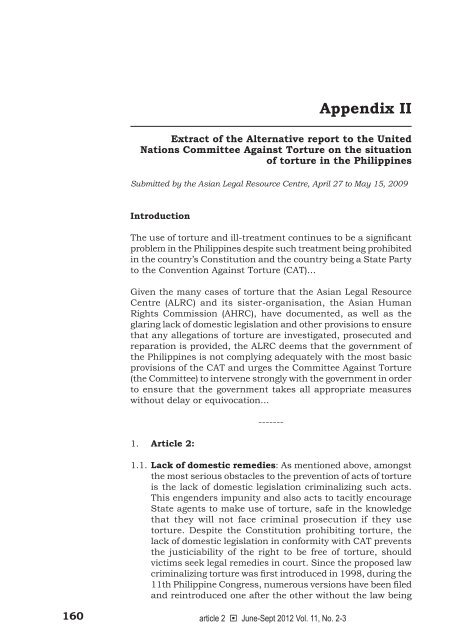You also want an ePaper? Increase the reach of your titles
YUMPU automatically turns print PDFs into web optimized ePapers that Google loves.
160<br />
article 2 � June-Sept 2012 Vol. 11, No. 2-3<br />
Appendix II<br />
Extract of the Alternative report to the United<br />
Nations Committee Against Torture on the situation<br />
of torture in the Philippines<br />
Submitted by the Asian Legal Resource Centre, April 27 to May 15, 2009<br />
Introduction<br />
The use of torture and ill-treatment continues to be a significant<br />
problem in the Philippines despite such treatment being prohibited<br />
in the country’s Constitution and the country being a State Party<br />
to the Convention Against Torture (CAT)...<br />
given the many cases of torture that the Asian Legal Resource<br />
Centre (ALRC) and its sister-organisation, the Asian human<br />
Rights Commission (AhRC), have documented, as well as the<br />
glaring lack of domestic legislation and other provisions to ensure<br />
that any allegations of torture are investigated, prosecuted and<br />
reparation is provided, the ALRC deems that the government of<br />
the Philippines is not complying adequately with the most basic<br />
provisions of the CAT and urges the Committee Against Torture<br />
(the Committee) to intervene strongly with the government in order<br />
to ensure that the government takes all appropriate measures<br />
without delay or equivocation...<br />
1. Article 2:<br />
-------<br />
1.1. Lack of domestic remedies: As mentioned above, amongst<br />
the most serious obstacles to the prevention of acts of torture<br />
is the lack of domestic legislation criminalizing such acts.<br />
This engenders impunity and also acts to tacitly encourage<br />
State agents to make use of torture, safe in the knowledge<br />
that they will not face criminal prosecution if they use<br />
torture. Despite the Constitution prohibiting torture, the<br />
lack of domestic legislation in conformity with CAT prevents<br />
the justiciability of the right to be free of torture, should<br />
victims seek legal remedies in court. Since the proposed law<br />
criminalizing torture was first introduced in 1998, during the<br />
11th Philippine Congress, numerous versions have been filed<br />
and reintroduced one after the other without the law being


